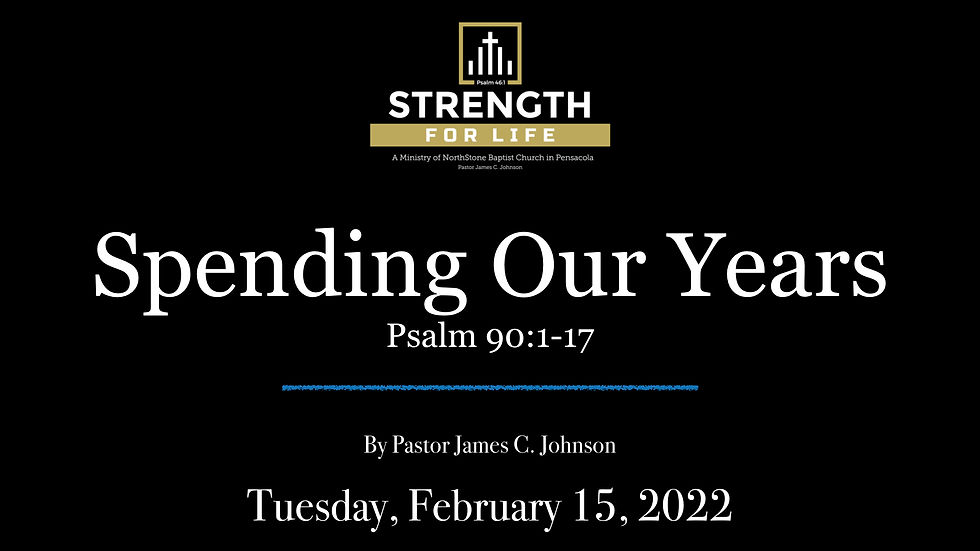Spending Our Years
- Strength For Life
- Feb 15, 2022
- 3 min read
Updated: Nov 18, 2022

Psalm 90:9, “…we spend our years as a tale that is told.” Notice verse 12, “So” Moses prays, “teach us to number our days, that we may apply our hearts unto wisdom.”
The phrases “spend our years,” “a tale (or story) that is told,” and “number our days” are synonymous with one another and are each a recognition of the stewardship of life. Take a moment to reread those three phrases and verify that they indeed do indicate a recognition of the stewardship of life.
Further, in an effort to remind the reader of the responsibility to steward life well, Moses asks God to “teach us” so that we will “apply our hearts unto wisdom.”
He prays that we would spend our years WISELY; that the tale (story) of our lives would be lived out WISELY; that the numbering of our days would reflect WISDOM.
He is essentially saying, “Life is a brief stewardship so apply yourself to God’s wisdom.”
As you live your life, as you write your story, and spend your years, are you applying yourself to wisdom?
A parallel passage to this text is Ephesians 5:15-16 where the Bible tells us to “…walk circumspectly, not as fools, but as wise. Redeeming the time, because the days are evil.”
Both Psalm 90 and this section of Ephesians 5 call the reader to wise stewardship of life. Wisdom never forgets who God is, understands who we are, and wisdom recognizes our prayerful stewardship to live life as unto Him.
1. Who God Is
Read through Psalm 90 and you will see Moses wisely describing who God is.
~ God transcends human generations. (vs 1)
~ God existed before the mountains were brought forth or even before the earth was formed. (vs 1)
~ He is “from everlasting to everlasting.” (vs 2)
~ He has the power to turn mankind to dust. (vs 3) His wrath is set against sin and He has the power to consume or bring us to an end. (vs 7; 9a)
~ God sees all, even our “secret sins.“ (vs 8)
If we are going to “spend our years“ wisely, we must live in light of the truth that God transcends human generations; is eternal; sees all of our secret sins, and can consume or destroy us.
2. Who We Are
We are virtually the opposite of everything God is. We are destructible (vs 3), and finite. (vs 4-6.). Moses uses the metaphors of a “flood” and the fleeting lifecycle of “grass” to contrast God‘s eternality with our earthly brevity (vs 4-6; 10).
We are sinful, and the object of God‘s wrath because of our iniquities.
3. Our Prayerful Stewardship
In light of what Moses explains about who God is, and who we are, he prays the following:
“Lord, teach us, (vs 12) return us, (vs 13) satisfy us, (vs 14) gladden us, (vs 15) appear unto us, (vs 16) and favor us with your beauty. (vs 17).”
Moses concludes his prayer by asking God to establish the work of our hands. Then, he restates his desire for God to establish the work of our hands. (vs 17)
Conclusion:
In order for us to steward life well, we must avoid the human propensity towards self-idolatry. When we see God for who He is; so much more powerful than who we are, we spend our years recognizing His supremacy and mastery over us.
And if we are to steward life wisely, we will pray these requests (vs 12-17) fervently.
As we spend our years, we constantly recognize our need for Him to teach us, return us, satisfy us, gladden us, appear onto us, and favor us.
This is what it means to “apply our hearts onto wisdom” in the midst of our fleeting days.
The constant recognition of His supremacy, as well as the humble petition of these prayer requests is what it means to “walk circumspectly” as we “redeem the time” and “spend our years.”
The above article was written by James C. Johnson and is a sermon he recently preached. James C. Johnson is the Pastor of NorthStone Baptist Church in Pensacola. To offer him your feedback, comment below or email him at pastor@northstonebaptist.org.
Every Tuesday, SFL publishes relevant Bible-based content. Check back next Tuesday to read the next SFL article.
Comentarios